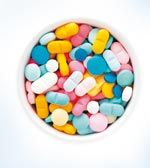Dietary Supplements Tainted with Amphetamine Isomer BMPEA
Selected dietary supplements labelled to contain Acacia rigidula have been found to be adulterated with the amphetamine isomer ?-methylphenylethylamine (BMPEA).
Selecte
Photo Credit: FotografiaBasica/Getty Images

d dietary supplements labelled to contain Acacia rigidula have been found to be adulterated with the amphetamine isomer β-methylphenylethylamine (BMPEA).1 This is not, however, a new finding. In 2014 the U.S. Food and Drug Administration (FDA) published on the detection of BMPEA in Acacia rigidula dietary supplements, but failed to warn consumers of the potential danger from the adulterant.2
The compound BMPEA was first synthesized in the early 1930s as a substitute for amphetamines, but, until recently, was treated as a research chemical. It is not found naturally in Acacia rigidula, but is added as an additional (often unlisted) ingredient for its physiological effects even though it has not been evaluated for safety in humans. Dr. Pieter Cohen of Harvard Medical School in Massachusetts, USA, told The Column: “We were aware of the FDA findings and mystified that they had not warned consumers or clarified the legality of these spiked products. We were interested to know what would manufacturers do once the FDA had discovered the stimulant.”
The authors purchased 21 dietary supplements labelled as containing Acacia rigidula online in the USA in 2014, and performed liquid chromatography-quadrupole time-of-flight mass spectrometry (LC-QTOF-MS) analyses. The paper reports that more than half of the samples were adulterated with BMPEA ranging from 8.4% to 31.8% per serving. Although only a small number of supplements were analyzed, making it impossible to know if the BMPEA adulteration is a limited issue, it is concerning that the FDA have not exercised their regulatory power to force manufacturers to remove BMPEA.
In a press release published in response to the study by the Council for Responsible Nutrition,3 Steve Mister, president & CEO, said: “Given FDA’s earlier findings combined with this new study by Dr. Cohen, we urge FDA to take immediate enforcement action against these adulterated products containing BMPEA and the companies illegally spiking these products with this synthetic drug. BMPEA does not appear to be a legitimate dietary ingredient, and therefore its inclusion in a product labelled as a dietary supplement makes the product adulterated under the Dietary Supplement Health & Education Act (DSHEA).” - B.D.
References
1. P.A. Cohen, C. Bloszies, and R. Gerona, Drug Testing and Analysis DOI 10.1002/dta.1793 (2015).
2. R.S. Pawar, E. Grundel, A.R. Fardin-Kia, and J.I. Rader, Journal of Pharmaceutical and Biomedical Analysis88, 457-466 (2014) doi:10.1016/j.jpba.2013.09.012.
3. Council for Responsible Nutrition: Press Release “CRN Asks FDA to Enforce the Law” (Last Accessed 10 April 2015: http://www.crnusa.org/CRNPR15-AsksFDAtoEnforcetheLaw040715.html)

Evaluating the Accuracy of Mass Spectrometry Spectral Databases
May 12th 2025Mass spectrometry (MS) can be effective in identifying unknown compounds, though this can be complicated if spectra is outside of known databases. Researchers aimed to test MS databases using electron–ionization (EI)–MS.

.png&w=3840&q=75)

.png&w=3840&q=75)



.png&w=3840&q=75)



.png&w=3840&q=75)










